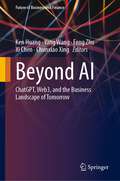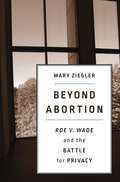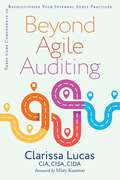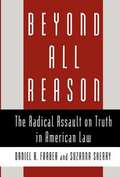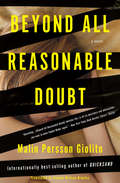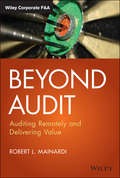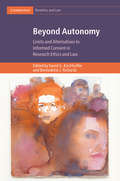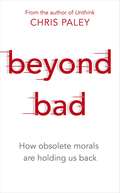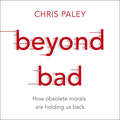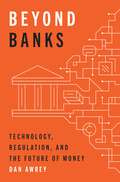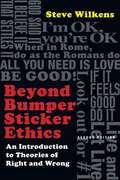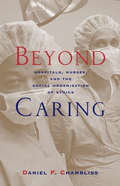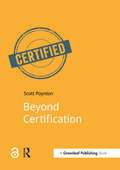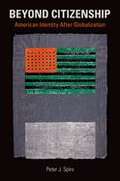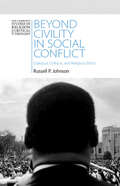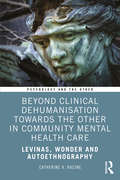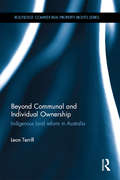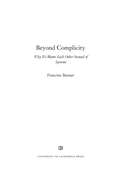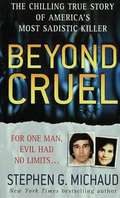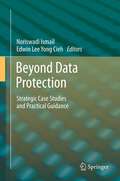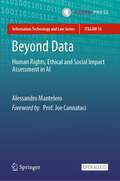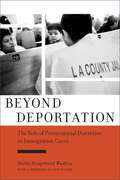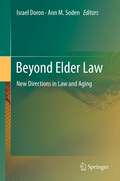- Table View
- List View
Beyond AI: ChatGPT, Web3, and the Business Landscape of Tomorrow (Future of Business and Finance)
by Xi Chen Feng Zhu Yang Wang Chunxiao Xing Ken HuangThis book explores the transformative potential of ChatGPT, Web3, and their impact on productivity and various industries. It delves into Generative AI (GenAI) and its representative platform ChatGPT, their synergy with Web3, and how they can revolutionize business operations. It covers the potential impact surpassing prior industrial revolutions.After providing an overview of GenAI, ChatGPT, and Web3, it investigates business applications in various industries and areas, such as product management, finance, real estate, gaming, and government, highlighting value creation and operational revolution through their integration. It also explores their impact on content generation, customer service, personalization, and data analysis and examines how the technologies can enhance content quality, customer experiences, sales, revenue, and resource efficiency. Moreover, it addresses security, privacy, and ethics concerns, emphasizing the responsible implementation of ChatGPT and Web3. Written by experts in this field, this book is aimed at business leaders, entrepreneurs, students, investors, and professionals who are seeking insights into ChatGPT, ChatGPT Plug-in, GPT-based autonomous agents, and the integration of Gen AI and Web3 in business applications.
Beyond Abortion: <i>Roe v. Wade</i> and the Battle for Privacy
by Mary Ziegler ZieglerFor most Americans today, Roe v. Wade concerns just one thing: the right to choose abortion. But the Supreme Court’s decision once meant much more. The justices ruled that the right to privacy encompassed the abortion decision. Grassroots activists and politicians used Roe—and popular interpretations of it—as raw material in answering much larger questions: Is there a right to privacy? For whom, and what is protected? As Mary Ziegler demonstrates, Roe’s privacy rationale attracted a wide range of citizens demanding social changes unrelated to abortion. Movements questioning hierarchies based on sexual orientation, profession, class, gender, race, and disability drew on Roe to argue for an autonomy that would give a voice to the vulnerable. So did advocates seeking expanded patient rights and liberalized euthanasia laws. Right-leaning groups also invoked Roe’s right to choose, but with a different agenda: to attack government involvement in consumer protection, social welfare, racial justice, and other aspects of American life. In the 1980s, seeking to unify a fragile coalition, the Republican Party popularized the idea that Roe was a symbol of judicial tyranny, discouraging anyone from relying on the decision to frame their demands. But Beyond Abortion illuminates the untapped potential of arguments that still resonate today. By recovering the diversity of responses to Roe, and the legal and cultural battles it energized, Ziegler challenges readers to come to terms with the uncomfortable fact that privacy belongs to no party or cause.
Beyond Agile Auditing: Three Core Components to Revolutionize Your Internal Audit Practices
by Clarissa LucasBeyond Agile Auditing shows auditors and organizational leaders how to revolutionize the audit experience.For decades, auditors have unintentionally struck fear in their clients. They are rarely welcomed into an area with open arms and are often viewed as one more obstacle to delivering value. But internal audit serves a vital function in reducing risk and ensuring success for all organizations.In Beyond Agile Auditing, experienced audit and risk management leader Clarissa Lucas shows organizations how to go beyond collaboration and build a partnership between auditors and clients. By leveraging this partnership, organizations can experience more value-added audit work, faster time to results (and resolution), greater engagement and satisfaction from all parties involved, and gain a competitive advantage in the marketplace,By building upon the work of the DevOps community, which reinvented the relationship between two groups that historically saw each other as adversaries and obstacles, Lucas applies new and better ways of working to the audit process. In this reimagined world, auditors (as well as other assurance providers) work closely with their clients to become strategic differentiators instead of obstacles, providing stakeholders value they never imagined. Come join us in this brave new world of audit.
Beyond All Reason
by Daniel A. Farber Suzanna SherryWould you want to be operated on by a surgeon trained at a medical school that did not evaluate its students? Would you want to fly in a plane designed by people convinced that the laws of physics are socially constructed? Would you want to be tried by a legal system indifferent to the distinction between fact and fiction? These questions may seem absurd, but these are theories being seriously advanced by radical multiculturalists that force us to ask them. These scholars assert that such concepts as truth and merit are inextricably racist and sexist, that reason and objectivity are merely sophisticated masks for ideological bias, and that reality itself is nothing more than a socially constructed mechanism for preserving the power of the ruling elite. In Beyond All Reason, liberal legal scholars Daniel A. Farber and Suzanna Sherry mount the first systematic critique of radical multiculturalism as a form of legal scholarship. Beginning with an incisive overview of the origins and basic tenets of radical multiculturalism, the authors critically examine the work of Derrick Bell, Catherine MacKinnon, Patricia Williams, and Richard Delgado, and explore the alarming implications of their theories. Farber and Sherry push these theories to their logical conclusions and show that radical multiculturalism is destructive of the very goals it wishes to affirm. If, for example, the concept of advancement based on merit is fraudulent, as the multiculturalists claim, the disproportionate success of Jews and Asians in our culture becomes difficult to explain without opening the door to age-old anti-Semitic and racist stereotypes. If historical and scientific truths are entirely relative social constructs, then Holocaust denial becomes merely a matter of perspective, and Creationism has as much "validity" as evolution. The authors go on to show that rather than promoting more dialogue, the radical multiculturalist preferences for legal storytelling and identity politics over reasoned argument produces an insular set of positions that resist open debate. Indeed, radical multiculturalists cannot critically examine each others' ideas without incurring vehement accusations of racism and sexism, much less engage in fruitful discussion with a mainstream that does not share their assumptions. Here again, Farber and Sherry show that the end result of such thinking is not freedom but a kind of totalitarianism where dissent cannot be tolerated and only the naked will to power remains to settle differences. Sharply written and brilliantly argued, this book is itself a model of the kind of clarity, civility, and dispassionate critical thinking which the authors seek to preserve from the attacks of the radical multiculturalists. With far-reaching implications for such issues as government control of hate speech and pornography, affirmative action, legal reform, and the fate of all minorities, Beyond All Reason is a provocative contribution to one of the most important controversies of our time.
Beyond All Reasonable Doubt: A Novel
by Malin Persson GiolitoFrom the award-winning author of Quicksand, a gripping legal thriller that follows one woman's conflicted efforts to overturn what may be a wrongful conviction. I'm giving you a chance to achieve every lawyer's dream, said Sophia Weber's old professor. Freeing an innocent man. Thirteen years ago, a fifteen-year-old girl was murdered. Doctor Stig Ahlin was sentenced to life in prison. But no one has forgotten the brutal crime. Ahlin is known as one of the most ruthless criminals.When Sophia Weber discovers critical flaws in the murder investigation, she decides to help Ahlin. But Sophia doing her utmost to get her client exonerated arouses many people's disgust. And the more she learns, the more difficult her job becomes. What kind of man is her client really? What has he done? And will she ever know the truth?
Beyond Audit: Auditing Remotely and Delivering Value (Wiley Corporate F&A)
by Robert L. MainardiYour game plan for strategic success in today’s remote audit department Beyond Audit is your guide to taking advantage of this unique moment to review and enhance your audit methodology to improve execution, operations, and audit product. Change has been thrust upon the audit industry, and every company must adapt to business interruptions and remote work environments. Now is the perfect time for audit departments to step back and turn a critical eye on their own operations. We have an opportunity to identify new ways of increasing product offerings and building more effective and efficient operations, ultimately creating better results for our partners and clients. This book will take you from a foundational understanding of the business environment through to a reflective review of your own operational effectiveness and efficiency. You’ll gain access to the Audit Risk Barometer (ARB), an innovative self-assessment tool that scores audit department strengths and opportunities for improvement. This book also includes a detailed methodology for working with your business partner to ensure clear identification of business objectives. You’ll also learn how to identify “true process risks” to ensure that testing remains focused and adds value. Finally, you'll learn critical skills and team development ideas for every level. Gain a fundamental understanding of today's business environment and how traditional and remote auditing fits into the new business puzzle Use the exclusive Audit Risk Barometer to conduct a valuable self-assessment and uncover your team’s strengths and weaknesses Learn how to effectively and efficiently work with your business partner to identify objectives and value-add opportunities Access online resources, including video summaries and interactive tools to revamp your audit department Beyond Audit incorporates links to online video summaries, templates mentioned throughout the book, interviews with experienced professionals, and an audit tracking software tool. This book is an enormously valuable resource for audit teams of any size and shape.
Beyond Autonomy: Limits and Alternatives to Informed Consent in Research Ethics and Law (Cambridge Bioethics and Law)
by David G. Kirchhoffer Bernadette J. RichardsRespect for autonomy has become a fundamental principle in human research ethics. Nonetheless, this principle and the associated process of obtaining informed consent do have limitations. This can lead to some groups, many of them vulnerable, being left understudied. This book considers these limitations and contributes through legal and philosophical analyses to the search for viable approaches to human research ethics. It explores the limitations of respect for autonomy and informed consent both in law and through the examination of cases where autonomy is lacking (infants), diminished (addicts), and compromised (low socio-economic status). It examines alternative and complementary concepts to overcome the limits of respect for autonomy, including beneficence, dignity, virtue, solidarity, non-exploitation, vulnerability and self-ownership. It takes seriously the importance of human relationality and community in qualifying, tempering and complementing autonomy to achieve the ultimate end of human research - the good of humankind.
Beyond Bad: How obsolete morals are holding us back
by Chris Paley'Brilliantly unillusioned thinking... It could hardly be more necessary in these all-too-moralistic times' - James Marriott, THE TIMESMorals have held empires together, kept soldiers marching under fire, fed the hungry, passed laws, built walls, welcomed immigrants, destroyed careers and governed our sex lives. But what if morality's all meaningless rubbish, a malfunctioning relic of our evolutionary past? This is the provocative argument that Chris Paley makes. This isn't an attack on one set of moral codes or one way of thinking about ethics: it's a call for abolishing the whole caboodle.He uses evolutionary psychology to show how and why morality emerged: theyenabled our forebears to survive and prosper in tribal groups. Today, our morals constrain us, bias us, and push us in the wrong direction. The biggest challenges our species faces, whether global warming, nuclear proliferation or the rise of the robots, are pan-human. These challenges are beyond what our moral minds were designed to cope with. You can't build smartphones with stone-age axes, and you can't solve modern humanity's problems with tools that are designed to create primitive, competitive groups.From Chris Paley, author of the 'extraordinary', 'startling' and 'thought-provoking' Unthink, comes Beyond Bad, which shows morals hinder us from achieving what we want to achieve. Beyond Bad is the book that 'does for morals what Dawkins did for God'.
Beyond Bad: How obsolete morals are holding us back
by Chris Paley'Truly thought-provoking. Paley puts forth an astonishingly original hypothesis and defends it eloquently, marshalling cutting-edge science to argue against the very idea of morality.'Kurt Gray, Associate Professor, University of North Carolina, Chapel Hill'There is a serious challenge here to received ways of thinking for the lay public and professional moral philosophers alike.' John P Burgess, John N Woodhull Professor of Philosophy, Princeton UniversityMorals have held empires together, kept soldiers marching under fire, fed the hungry, passed laws, built walls, welcomed immigrants, destroyed careers and governed our sex lives. But what if morality's all meaningless rubbish, a malfunctioning relic of our evolutionary past? This is the provocative argument that Chris makes. This isn't an attack on one set of moral codes or one way of thinking about ethics: it's a call for abolishing the whole caboodle.He uses evolutionary psychology to show how and why morality emerged: theyenabled our forebears to survive and prosper in tribal groups. Today, our morals constrain us, bias us, and push us in the wrong direction. The biggest challenges our species faces, whether global warming, nuclear proliferation or the rise of the robots, are pan-human. These challenges are beyond what our moral minds were designed to cope with. You can't build smartphones with stone-age axes, and you can't solve modern humanity's problems with tools that are designed to create primitive, competitive groups.From Chris Paley, author of the 'extraordinary', 'startling' and 'thought-provoking' Unthink, comes Beyond Bad, which shows morals hinder us from achieving what we want to achieve. Beyond Bad is the book that 'does for morals what Dawkins did for God'.
Beyond Bad: How obsolete morals are holding us back
by Chris Paley'Brilliantly unillusioned thinking... It could hardly be more necessary in these all-too-moralistic times' - James Marriott, THE TIMES'There is a serious challenge here to received ways of thinking for the lay public and professional moral philosophers alike.' John P Burgess, John N Woodhull Professor of Philosophy, Princeton UniversityScientific research has achieved what thousands of years of philosophising failed to do: explain why we have morals and how they work. The answers are surprising and frequently disturbing.Morals have held empires together, kept soldiers marching under fire, fed the hungry, passed laws, built walls, welcomed immigrants, destroyed careers and governed our sex lives. But what if morality's all meaningless rubbish, a malfunctioning relic of our evolutionary past?This is the provocative argument that Chris makes. This isn't an attack on one set of moral codes or one way of thinking about ethics: it's a call for abolishing the whole caboodle.He uses evolutionary psychology to show how and why morality emerged: they enabled our forebears to survive and prosper in tribal groups. Today, our morals constrain us, bias us, and push us in the wrong direction.The biggest challenges our species faces, whether global warming, nuclear proliferation or the rise of the robots, are pan-human. These challenges are beyond what our moral minds were designed to cope with. You can't build smartphones with stone-age axes, and you can't solve modern humanity's problems with tools that are designed to create primitive, competitive groups.From Chris Paley, author of the 'extraordinary', 'startling' and 'thought-provoking' Unthink, comes Beyond Bad, which shows morals hinder us from achieving what we want to achieve. Beyond Bad is the book that 'does for morals what Dawkins did for God'. (P) 2021 Hodder & Stoughton Ltd
Beyond Banks: Technology, Regulation, and the Future of Money
by Dan AwreyHow new technology is rapidly changing the nature of money and the way we payA diverse and growing range of financial institutions and platforms—from PayPal and Venmo to WeChat, Alipay, and the brave new world of stablecoins—has harnessed new technology to disrupt the system of money and payments as we know it. Beyond Banks explains why this disruption holds out the promise of faster, cheaper, more convenient, and more secure payments, but also how it increasingly risks exposing consumers, businesses, and governments to the problem of bad money.Dan Awrey traces the origins of our current bundled system of banking, money, and payments. He explains why the problem of bad money—the result of antiquated and inadequate laws and regulation that fail to establish credible commitments to hold, transfer, or return a customer&’s money on demand—requires that policymakers fundamentally rethink their approach toward the design of the laws and institutions at the heart of this system. He presents ways to effectively unbundle banking from money and payments, ensure the credibility of monetary commitments, and promote the stability of this system. Awrey also envisions a more forward-looking role for policymakers in encouraging greater technological experimentation, competition, and innovation in the realm of payments.Beyond Banks sheds critical light on the important but too often dysfunctional relationship among technology, regulation, and money, and lays the foundations for a safer, more nimble, and more inclusive system of money and payments.
Beyond Bumper Sticker Ethics: An Introduction to Theories of Right and Wrong
by Steve WilkensIdeas have consequences. And sometimes those ideas can be squeezed into slogans, slapped on bumper stickers and tweeted into cyberspace. These compact messages coming at us from all directions often compress in a few words entire ethical systems. It turns out that there's a lot more to the ideas behind these slogans--ideas that need to be sorted out before we make important moral decisions as individuals or as societies. In this revised and expanded edition of Steve Wilkens's widely-used text, the author has updated his introductions to basic ethical systems:cultural relativismethical egoismutilitarianismbehaviorismsituation ethicsKantian ethicsvirtue ethicsnatural law ethicsdivine command theoryHe has also added two new chapters:evolutionary ethicsnarrative ethicsWith clarity and wit Wilkens unpacks the complicated ideas behind the slogans and offers Christian evaluations of each.
Beyond Caring: Hospitals, Nurses, and the Social Organization of Ethics (Morality And Society Ser.)
by Daniel F. ChamblissVividly documenting the real world of the contemporary hospital, its nurses, and their moral and ethical crises, Dan Chambliss offers a sobering revelation of the forces shaping moral decisions in our hospitals. Based on more than ten years' field research, Beyond Caring is filled with eyewitness accounts and personal stories demonstrating how nurses turn the awesome into the routine. It shows how patients, many weak and helpless, too often become objects of the bureaucratic machinery of the health care system and how ethics decisions, once the dilemmas of troubled individuals, become the setting for political turf battles between occupational interest groups. The result is a compelling combination of realism and a powerful theoretical argument about moral life in large organizations.
Beyond Certification (Doshorts Ser.)
by Scott PoyntonThis book is free to download in PDF and EPub formats. Is certification the solution? Can it deliver urgently needed improvements to complex problems like deforestation and the exploitation of people? In this controversial new book, Scott Poynton, founder of The Forest Trust, makes a compelling case for a new approach to social and environmental problems that goes "beyond certification".Certification emerged from the 1992 Rio Earth Summit amidst great hope. Since then, despite a proliferation of certification schemes in twenty-five industry sectors, the destructive and irresponsible exploitation of natural and human resources has grown still worse. Beyond Certification reviews the positive aspects of certification, of which there are many, but argues that we can no longer afford to gloss over its failures. The book offers an alternative model, VT-TV, based on Values, Transparency, Transformation and Verification, which the author has been exploring and implementing with over 70 companies and industries around the world. These companies are transforming the story of the raw materials they use – wood, palm oil, pulp and paper, stone, charcoal, soy, beef, sugar, dairy, rubber, coffee, cocoa and coconut. Mining companies are also exploring this approach, making decisions aligned with fundamental values and what they know to be right.The results? Trust is emerging as former combatants awake to the importance of working together. Guns have been removed from forests, land set aside for protection, worker rights and conditions improved and long-standing conflicts have been resolved as people confront their legacies. Beyond Certification does not claim that this VT-TV model is the only solution. Rather, it shows how new and seemingly radical thinking can catalyze positive change. Included: the limits of roundtable certification illustrated with real, practical examples; the intricacies of the change process – how companies move from destructive to more responsible practices; how to implement more holistic, economically effective, durable systems to better protect people and the environment.
Beyond Citizenship: American Identity After Globalization
by Peter J. SpiroAmerican identity has always been capacious as a concept but narrow in its application. Citizenship has mostly been about being here, either through birth or residence. The territorial premises for citizenship have worked to resolve the peculiar challenges of American identity. But globalization is detaching identity from location. What used to define American was rooted in American space. Now one can be anywhere and be an American, politically or culturally. <p><p> Against that backdrop, it becomes difficult to draw the boundaries of human community in a meaningful way. Longstanding notions of democratic citizenship are becoming obsolete, even as we cling to them. This book charts the trajectory of American citizenship and shows how American identity is unsustainable in the face of globalization. The author describes how citizenship law once reflected and shaped the American national character. He explores the histories of birthright citizenship, naturalization, dual citizenship, and how those legal regimes helped reinforce an otherwise fragile national identity. But on a shifting global landscape, citizenship status has become increasingly divorced from any sense of actual community on the ground. <p><p> As the bonds of citizenship dissipate, membership in the nation-state becomes less meaningful. The rights and obligations distinctive to citizenship are now trivial. Naturalization requirements have been relaxed, dual citizenship embraced, and territorial birthright citizenship entrenched―developments that are all irreversible. Loyalties, meanwhile, are moving to transnational communities defined in many different ways: by race, ethnicity, gender, religion, age, and sexual orientation. These communities, the author boldly argues, are replacing bonds that once connected people to the nation-state, with profound implications for the future of governance.
Beyond Civility in Social Conflict: Dialogue, Critique, and Religious Ethics (New Cambridge Studies in Religion and Critical Thought)
by Russell P. JohnsonHow can one speak and act in ways that overcome entrenched social conflicts? In polarized societies, some insist that the survival of democracy depends on people abiding by rules of civility and mutual respect. Others argue that the political situation is so dire that one's values need to be fought for by any means necessary. Across the political spectrum, people feel like they need to choose between the morality of dialogue and the effectiveness of protest. Beyond Civility in Social Conflict makes an important intervention in this debate. Taking insights from nonviolent direct action, it provides a model for advocacy that is both compassionate and critical. Successful communicators can help their opponents by dismantling the illusions and unjust systems that impede human flourishing and pit people against one another. The final chapter turns specifically to Christian ethics, and what it means to 'love your enemies' by disagreeing with them.
Beyond Clinical Dehumanisation towards the Other in Community Mental Health Care: Levinas, Wonder and Autoethnography (Psychology and the Other)
by Catherine A. RacineBeyond Clinical Dehumanisation Toward the Other in Community Mental Health Care offers a rare and intimate portrayal of the moral process of a mental health clinician that interrogates the intractable problem of systemic dehumanisation in community mental health care and looks to the notion of "wonder" and the visionary relational ethics of Emmanuel Levinas for a possible cure. An interdisciplinary study with transdisciplinary aspirations, this book contributes an original and compelling voice to the emerging therapeutic conversation attempting to re-imagine and transcend the objectifying constraints of the dominant discourse and the reductive world view that drives it. Chapters bring into dialogue the fields of community mental health care, psychology, psychology and the Other, the philosophy of wonder, Levinasian ethics, clinical ethics, the moral research of autoethnography and the medical humanities, to consider the defilement of the vulnerable help seeker, the moral injury of the clinician and look for answers beyond. This book is an ethical primer for mental health professionals, researchers, educators, advocates and service users working to re-imagine and heal a broken system by challenging the underpinnings of entrenched dehumanisation and standing with those they "serve".
Beyond Communal and Individual Ownership: Indigenous Land Reform in Australia (Routledge Complex Real Property Rights Series)
by Leon TerrillOver the last decade, Australian governments have introduced a series of land reforms in communities on Indigenous land. This book is the first in-depth study of these significant and far reaching reforms. It explains how the reforms came about, what they do and their consequences for Indigenous landowners and community residents. It also revisits the rationale for their introduction and discusses the significant gap between public debate about the reforms and their actual impact. Drawing on international research, the book describes how it is necessary to move beyond the concepts of communal and individual ownership in order to understand the true significance of the reforms. The book's fresh perspective on land reform and careful assessment of key land reform theories will be of interest to scholars of indigenous land rights, land law, indigenous studies and aboriginal culture not only in Australia but also in any other country with an interest in indigenous land rights.
Beyond Complicity: Why We Blame Each Other Instead of Systems
by Francine BannerAn ambitious study of our obsession with complicity that shows how we can all become "good accomplices." Beyond Complicity is a fascinating cultural diagnosis that identifies our obsession with complicity as a symptom of a deeply divided society. The questions surrounding what it means to be legally complicit are the same ones we may ask ourselves as we evaluate our own and others' responsibility for inherited and ongoing harms, such as racism, sexism, and climate change: What does it mean that someone "knew" they were contributing to wrongdoing? How much involvement must a person have in order to be complicit? At what point are we obligated to intervene? Francine Banner ties together pop culture, politics, law, and social movements to provide a framework for thinking about what we know intuitively: that our society is defined by crisis, risk, and the quest to root out hazards at all costs. Engaging with legal cases, historical examples, and contemporary case studies, Beyond Complicity unfolds the complex role that complicity plays in US law and society today, offering suggestions for how to shift focus away from blame and toward positive, lasting systemic change.
Beyond Cruel: The Chilling True Story Of America's Most Sadistic Killer
by Stephen G. MichaudMike DeBardeleben was known as the Mall Passer for the way he passed off fake money at local shopping centers. But when U.S. Secret Service agents finally arrested him, they were met with more than just phony bills. They found that their counterfeiter led a shocking double life... <p><p> DeBardeleben's home was littered with drugs, bondage gear, and a collection of audio tapes in which he recorded the abuse of his countless victims. As the evidence mounted, a terrifying profile emerged of a man who forced women to be his accomplices, practiced sadism, even dressed up in women's clothes—a serial killer whose depraved fantasies led to a spree of violence that would last as long as eighteen years...and would end in a sentence of almost 400 years in prison. As terrifying as it is true, this is the story of a man who proved to be, beyond the shadow of a doubt, BEYOND CRUEL.
Beyond Data Protection: Strategic Case Studies and Practical Guidance
by Edwin Lee Yong Cieh Noriswadi IsmailThe book deals with data protection issues from practical viewpoints. 40% of the content focus on the Malaysian Personal Data Protection Act (PDPA) 2010 progress, whilst 60% of the content focus on leading comparative practical guidance from Europe. Part of the PDPA provisions is mirrored from European approaches and practices. The approach of this book is straightforward, handy and readable and is supplemented by practical applications, illustrations, tables and diagrams. Practical examples highlighted in this book range from cloud computing, radio frequency identification technology, social media networks and information security to basic related aspects of data protection issues covering strategic leadership, management, governance and audit in businesses, organisations and local authorities. Recommended best practices have been outlined for practical guidance accompanied with future challenges and opportunities for Malaysia and ASEAN. The book is equally suitable for academics, practitioners, governmental officials and regulators dealing with data protection within their sector-specific legislation.
Beyond Data: Human Rights, Ethical and Social Impact Assessment in AI (Information Technology and Law Series #36)
by Alessandro ManteleroThis open access book focuses on the impact of Artificial Intelligence (AI) on individuals and society from a legal perspective, providing a comprehensive risk-based methodological framework to address it. Building on the limitations of data protection in dealing with the challenges of AI, the author proposes an integrated approach to risk assessment that focuses on human rights and encompasses contextual social and ethical values. The core of the analysis concerns the assessment methodology and the role of experts in steering the design of AI products and services by business and public bodies in the direction of human rights and societal values. Taking into account the ongoing debate on AI regulation, the proposed assessment model also bridges the gap between risk-based provisions and their real-world implementation. The central focus of the book on human rights and societal values in AI and the proposed solutions will make it of interest to legal scholars, AI developers and providers, policy makers and regulators. Alessandro Mantelero is Associate Professor of Private Law and Law & Technology in the Department of Management and Production Engineering at the Politecnico di Torino in Turin, Italy.
Beyond Deportation: The Role of Prosecutorial Discretion in Immigration Cases (Citizenship and Migration in the Americas #4)
by Shoba Sivaprasad WadhiaThe first book to comprehensivelydescribe the history, theory, and application of prosecutorial discretion inimmigration law When Beatles star John Lennon faced deportation from the U.S. in the 1970s, his lawyer Leon Wildes made a groundbreaking argument. He argued that Lennon should be granted “nonpriority” status pursuant to INS’s (now DHS’s) policy of prosecutorial discretion. In U.S. immigration law, the agency exercises prosecutorial discretion favorably when it refrains from enforcing the full scope of immigration law. A prosecutorial discretion grant is important to an agency seeking to focus its priorities on the “truly dangerous” in order to conserve resources and to bring compassion into immigration enforcement. The Lennon case marked the first moment that the immigration agency’s prosecutorial discretion policy became public knowledge. Today, the concept of prosecutorial discretion is more widely known in light of the Obama Administration’s Deferred Action for Childhood Arrivals or DACA program, a record number of deportations and a stalemate in Congress to move immigration reform.Beyond Deportation is the first book to comprehensively describe the history, theory, and application of prosecutorial discretion in immigration law. It provides a rich history of the role of prosecutorial discretion in the immigration system and unveils the powerful role it plays in protecting individuals from deportation and saving the government resources. Shoba Sivaprasad Wadhia draws on her years of experience as an immigration attorney, policy leader, and law professor to advocate for a bolder standard on prosecutorial discretion, greater mechanisms for accountability when such standards are ignored, improved transparency about the cases involving prosecutorial discretion, and recognition of “deferred action” in the law as a formal benefit.
Beyond Elder Law: New Directions in Law and Aging
by Ann M. Soden Israel DoronAll over the world, there is a growing interest in the relationship between law and aging: How does the law influence the lives of older people? Can rights, advocacy and representation advance the social position of the aged and combat ageism? What are the new and cutting-edge frontiers in the field of elder law? Should there be a new international human rights convention in this field? These are only a few of the many questions that arise. This book attempts to answer some of these questions and to set the agenda for the future development of elder law across the globe. Taking into account existing research and knowledge, leading scholars from different continents (North America, Europe, Asia, and Australia) present in this book original and novel ideas regarding the future development of elder law. These ideas touch upon key topics such as elder guardianship, citizenship, mental capacity, elder abuse, human rights and international law, family relationships, age discrimination, and the right to die. This book can thus serve as an important reference work for all those interested in understanding where law and aging are headed, and for those concerned about the future legal rights of older persons.
Beyond Elite Law: Access to Civil Justice in America
by Samuel Estreicher Estreicher, Samuel and Radice, Joy Joy RadiceAre Americans making under $50,000 a year compelled to navigate the legal system on their own, or do they simply give up because they cannot afford lawyers? We know anecdotally that Americans of median or lower income generally do without legal representation or resort to a sector of the legal profession that - because of the sheer volume of claims, inadequate training, and other causes - provides deficient representation and advice. This book poses the question: can we - at the current level of resources, both public and private - better address the legal needs of all Americans? Leading judges, researchers, and activists discuss the role of technology, pro bono services, bar association resources, affordable solo and small firm fees, public service internships, and law student and nonlawyer representation.
